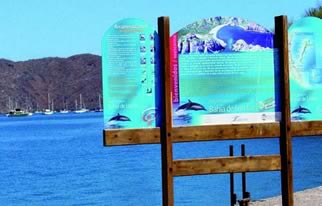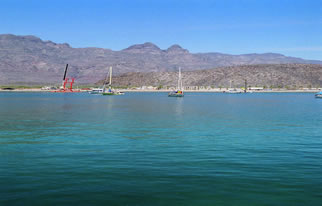
Loreto Bay National Park, Baja California Sur, an Example of the Power of an Organized Citizenry
Sergio Morales Polo
LORETO, B.C.S.
In 1992 the survival of the residents of Loreto was at risk: shore and sportfishing stock (a principal source of their food, of their family income and the base of their economy) was noticeably being depleted. The principal causes were: the large-scale fishing that was being practiced by Japanese factory ships; gill nets; long lines of several kilometers in length; the use of nets with very a small mesh size (that trap young specimens); and the lack of respect for established seasons and bans.

Welcome. Photo: PECE
All of these bad practices had been promoted by the lack of policing and the corruption of the corresponding government officials. From 1972 onward, concerned Loreto residents would raise their problem with whichever government official that had arrived in town: presidents of the Republic, ministers, senators, governors and representatives found out about their misfortune and promised solutions that were never fulfilled. As is typical with political demagogues, they would say whatever the residents wanted to hear in order to keep them happy, and then they would forget about the issue.
In this manner, 20 years passed, until finally the residents realized that they had been using the wrong strategy: isolated verbal complaints without follow-up or public support. By then, the scarcity of fish had worsened and one had to go various kilometers out to sea, which meant a greater expense of time and gasoline. This crisis generated a social energy (discontent, concern and the desire to do something) rarely put to use, and because of this, they decided in 1993 to marshal their efforts and they created a non-profit organization called Grupo Ecologista Antares. This action lent the movement various benefits:
1) Legitimacy and Representation. The association, which was composed of prominent members of the community, had a legal standing that lent strength to the cause.
2) Ability to Convene. The group’s legitimacy and the prominence of its membership, in addition to the common nature of the problem being addressed, motivated the various parties to participate.
3) Organization of Social Energy. The leaders would meet every Tuesday at 7 pm to look through the news headlines, listen to ideas and to lay out plans, as well as to give reports to the public. This produced a sustained, persistent and timely follow-up with responsible officials through the use of letters, telephone messages, telegrams and faxes.
4) Desanctifying the Governor. After repeated passivity and ineffectualness on the part of various governors, the public finally shed any of its ancestral fears held towards this “supreme leader” (who in Mexico is seen almost as a patriarch). This led to the collapse of the hierarchy of authority that had been in place in Mexico since 1769 and that had impeded the public’s ability to speak with their leaders about public issues; it had always been difficult to talk to the governor or political chief because one just did not air dirty laundry in public. It was this authoritarian principle or standing that gave rise to governors using a great deal of discretion in their dealing with an issue. If it didn’t fit with their own interests, they would just bury it in the deep drawers of the bureaucracy.
5) Social support. News of the movement generated by Antares through interviews, public actions, bulletins and press conferences awoke the sympathy and unity of local environmentalists, federal officials, and academics as well as foreign non-profit organizations.
6) Continuity and Credibility. Antares’ nonpartisan politics (that is, being unaffiliated with a particular political party) and its autonomy (independence from the government) generated confidence in its permanence as an organization and the continuity of its actions.
A decisive moment for the management of the area was the visit made to Loreto by the Minister of Tourism, Jesús Silva Herzog, in August 1994. Antares put together a document addressed to the president of Mexico, and signed by all of the involved parties including the minister himself, calling for his intervention in the creation of a protected natural area. Even Governor Guillermo Mercado, who opposed the initiative, had to sign under pressure due to the circumstances in which he found himself. Fifteen days later, Dr. Enriqueta

Part of the Loreto bay. Photo: PECE
Velarde, a federal official, arrived in Loreto to personally listen to the concerns of Loreto’s citizens. She suggested that they seek the legal status of a national marine park, with the goals being to allow for resource protection and the continuation of productive activities in a regulated manner.
Because the current federal government’s control would end on December 1, 1994, Dr. Velarde accelerated the integration of the presidential initiative and it was sent to the governor for his approval. However, the governor put it off, hoping that it would die along with the mandate of the current government. The change of government was more complicated than usual because of the country’s financial collapse and the uprising of the Zapatista Army of National Liberation (EZLN in Spanish). The park’s decree was removed from the government’s list of priorities and Antares had to wait another year to restart its struggle. Meanwhile, the organization wasn’t idle and actively engaged in impeding the privatization of Isla Coronados, where the construction of a hotel was being planned. It was an architecturally beautiful project that harmonized with the landscape, but would have impacted the ecological balance of a natural jewel, would have eliminated the chance for local service providers to offer sustainable tourism, and would have deprived breadwinners (those who manned the pangas that transported thousands of tourists each year wanting to enjoy the beautiful beaches and the island landscape) of an important income source. Fortunately for Loreto’s citizens and the world’s natural heritage, the project was cancelled.
In 1996, President Ernesto Zedillo decided to visit Loreto to present the government’s “National Program on the Environment 1996-2000” and it was considered a done deal that he would announce the creation of the longed-for national park. While it didn’t happen like that, something did occur that untangled the initiative: in the presidential bus, on the way to the airport from the presentation ceremony, Alfredo García Green, municipal president, told Zedillo that Loretans were waiting for him to favor them with the creation of the park. The Mexican president looked at Julia Carabias, the environmental minister, who explained to him that the decree was ready to send to the federal Congress, but that it was being delayed because the governor (who was present on the bus) was not giving his approval.
To excuse himself, Guillermo Mercado alleged that the Loretans wanted to have sole rights to the sea and that they would impede access to fishermen from other communities. García Green jumped up from his seat and clarified for President Zedillo that this wasn’t correct, and that the only thing they were trying to do was to use the resources rationally. Faced with this situation, Zedillo ordered Julia Carabias to release the decree in order for it to continue to be processed. Three months later, Congress published the decree in the official journal of the Federation.
Loreto’s citizens, through the actions of the organization that was created for the purpose, won the legal protection of a third of its territorial waters (206 sq. km or 128 sq. mi.), thereby forming the first protected natural area created through public petition. Until that time, all prior protected areas were determined by the federal government. This exemplary process demonstrates that:
a) An organized citizenry that has a social base and legitimacy has a great capacity for
achieving change.
b) Faced with the inability and negligence of governments, it becomes necessary for the
public to organize in order to fight for its well-being.
When the People organize, they can move mountains.